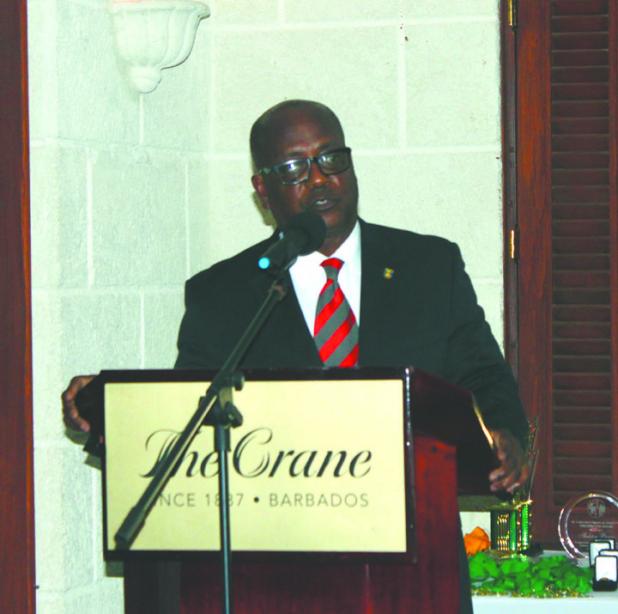
Barbados Cricket Association CEO, Noel Lynch, as he delivered the feature address at the St. Catherine’s Sports and Social Club Awards Ceremony.
BCA CEO Noel Lynch speaks at St. Catherine’s Awards
A major overhaul of existing systems is needed if the region intends to make its way to the top in world cricket once again. This is thinking of Barbados Cricket Association Chief Executive Officer, Noel Lynch. The Olympic sprinter and former government minister was the feature speaker when the St. Catherine’s Sports and Social Club held their Awards Ceremony and Dinner at the Crane Resort this past weekend.
Noting that his address was being delivered in what he called one of the most parlous periods in our country’s development, Lynch stated the island’s future development needed to be secured in part through non-traditional means of economic earning and social progress.
“What better way to do so than through the game of cricket as the base and as the model. This past-time has already been established as a significant game-changer and a weighty variable in our national development equation. Ladies and gentlemen, cricket is in our DNA. This sport is the only social or economic endeavour practised by our people in which we have produced the world’s best,” Lynch said.
Drawing attention to Sir Garfield Sobers, who is revered as the best to have ever played the game, the former tourism minister said that the island punched well above its weight with regards to the production of world-class players. “From parochial giants playing in obscure village leagues to national heroes with enormous athletic talent, cricket has, in great measure, defined us as a nation and refined us as a people. Barbadians are just good at cricket – full stop. This country has produced more excellent proponents of the game per square kilometre than any other region in the world. Whether it be England, Australia, even India. Barbados, not the West Indies, has produced more world-class cricketers per capita and probably by absolute measure than any other territory of its size anywhere on the globe.”
Harkening back to a time when the West Indies was the most-feared team in the world, Lynch said that time had long passed. “Historically, the Barbados approach to cricket development succinctly expressed was a stated commitment to administrative and technical brilliance that was seldom equalled and certainly never surpassed. The glory of those days, however, has waned in recent time and the evidence of this is manifested in cricketers and a national team, that even though they have recently returned to wining ways, are still not considered to be the world’s best in the Test or One Day versions of the game. Regarding the T20 format, whilst we produce more credible players in this version, they are still not considered to be the very best that the game has to offer,” he added.
Going on to say that the powers-that-be in the region were an “archaic group of thinkers and planners grounded in past”, Lynch added that what was needed now was a non-traditional approach to see the region getting back to the top of the game and enhancing earning and social development potential which were both tried and tested in other spheres of human development.
Noting that six of the 13 players making the final cut for the ongoing tour by England were Barbadians, Lynch said that it was a travesty that territorial bodies could not benefit from the products of their programmes. “The BCA and the clubs, which the BCA has assisted, have developed these men through the association’s development programme and during the most formative stages of their careers – Under-13, Under-15, Under-17 – and we continue to do so through the local association’s input to the organisation of cricket and to the local tournaments at the regional and international levels. However, when all is said and done, the West Indies Cricket Board will receive the bulk of the funds from this tournament, the players will be paid well, the stadium operator will get the corporate hospitality and concession funds, the entity which has produced the athletes, who are the centrepieces of the activity, earn little or nothing. How can this be? This is a situation that in my opinion must be hurriedly and properly corrected,” he said.
The BCA is now on the mend as they seek to secure the future development of the game through a new formal strategic plan. Looking to take cricket back to the communities through the revival and reinvigoration of clubs, the BCA is also looking to strengthen its ties with the regional governing body. “Finally, we have begun to work assiduously at first improving our existing relationship with the West Indies Cricket Board. The BCA and the West Indies Cricket Board are simply too far apart on simple issues that affect the game’s development. With an amateur or amateurish model, we have produced professional crickets that have the potential to beat the world. Surely this system must be upgraded and expanded. The system has already proven its worth, however, the more professional the outfit becomes, the more professional the overall game becomes,” he asserted.
Through this renewed partnership, Lynch hopes that new accords can be struck that would see all reaping the benefits. “A system of greater negotiated reward for the territorial boards from the WICB to truly build our professional units is critical to any future success as cricketing developing nations in a wider effort under the larger corporate banner of the West Indies. The system must also take the clubs at the territorial board level into consideration. To complete this cycle, players who make it through the system and are highly compensated must be made to give back to their clubs and to the central systems that have done so much to develop them. Systems of payment and reward in developing societies must be crafted in this manner,” he said. (MP)
